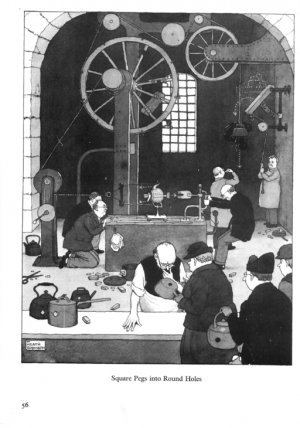Cumbria, Northumberland, Tyne and Wear NHS Foundation Trust v EG [2021] EWHC 2990 (Fam)
(Redirected from Cumbria, Northumberland, Tyne and Wear NHS Foundation Trust & Anor v EG (2021) EWHC 2990 (Fam))
DOL during conditional discharge This decision demonstrates the Heath Robinson nature of today's mental health law. (1) The Supreme Court decision in MM meant that the patient could no longer remain conditionally discharged because he was being deprived of his liberty within the meaning of Article 5, so he was made subject to a "technical recall" and remained in the community on s17 leave under the same conditions. (2) The MHT then conditionally discharged him again, having correctly applied other domestic case law, because he was receiving no treatment in hospital so could not remain on s17 leave. (3) The SSJ would recall him to hospital if DOL in the community could not be authorised. (4) The court held that this outcome would violate the patient's Article 5(1) rights because being in hospital, even as an out-patient, was counter-therapeutic. (5) In order to avoid this violation, s72 should be read and given effect under s3 Human Rights Act 1998 so that "suffering from mental disorder ... which makes it appropriate for him to be liable to be detained in a hospital for medical treatment" includes liability to be "detained for treatment", even where that treatment is being provided in the community, so long as it could lawfully be provided in hospital. (6) Obiter, the inherent jurisdiction does not extend to depriving a person with capacity of his liberty, so could not have been used in this case.
Note
The judgment states: "The conditions included that he must live at The Care Home, which would undoubtedly amount to a deprivation of his liberty within the Storck tests (Storck v Germany [2006] 43 EHRR 6)." This is wrong.
Illustration
Source: W Heath Robinson, Inventions (Duckworth 1973). Click image to enlarge.
See also
- Conditional discharge/DOL guidance. HM Prison and Probation Service, 'Guidance: Discharge conditions that amount to deprivation of liberty' (January 2019) — The aim of this this operational policy is to ensure that, where appropriate, restricted patients can continue their rehabilitation in a community-based setting following the Supreme Court's decision in SSJ v MM (2018) UKSC 60. For patients who lack capacity to consent to deprivation of liberty and the risk is to themselves, the solution is to allow conditional discharge with deprivation of liberty authorised under the Mental Capacity Act 2005. For patients who lack capacity and the risk is to others, and also for patients who have capacity, the solution, if further treatment and rehabilitation could be given in a community setting, is to consider long-term s17 escorted leave (use of the inherent jurisdiction is not considered to be the correct approach). The leave of absence would be for an initial period of up to 12 months. For patients already on conditional discharge, the following options will be considered: (a) variation of conditions; (b) recall, with or without instantaneous grant of escorted leave to the current placement; (c) absolute discharge; (d) referral to tribunal. The policy mentions reassessing patients who present risks to themselves in order to see if they lack capacity after all, which may an MCA authorisation possible.
Essex search
Full judgment: BAILII
Subject(s):
Date: 9/11/21🔍
Court: High Court (Family Division)🔍
Judge(s):
- Lieven🔍
Parties:
Citation number(s):
What links here:- Human Rights Act 1998
- SSJ v MM [2018] UKSC 60
- HM Prison and Probation Service, 'Guidance: Discharge conditions that amount to deprivation of liberty' (January 2019)
- Interface between MHA and MCA
- Jonathan Wilson, 'Mental health case law: update' (Legal Action, May 2022)
Published: 16/11/21 23:08
Cached: 2024-04-20 04:15:36
The following categories (in blue boxes) can be clicked to view a list of other pages in the same category:
